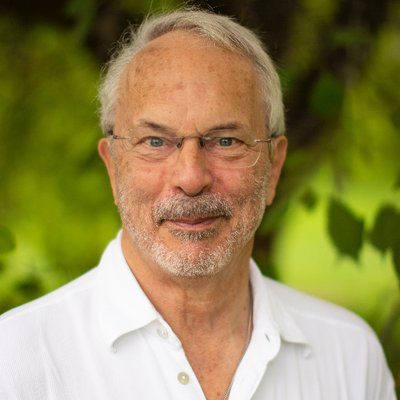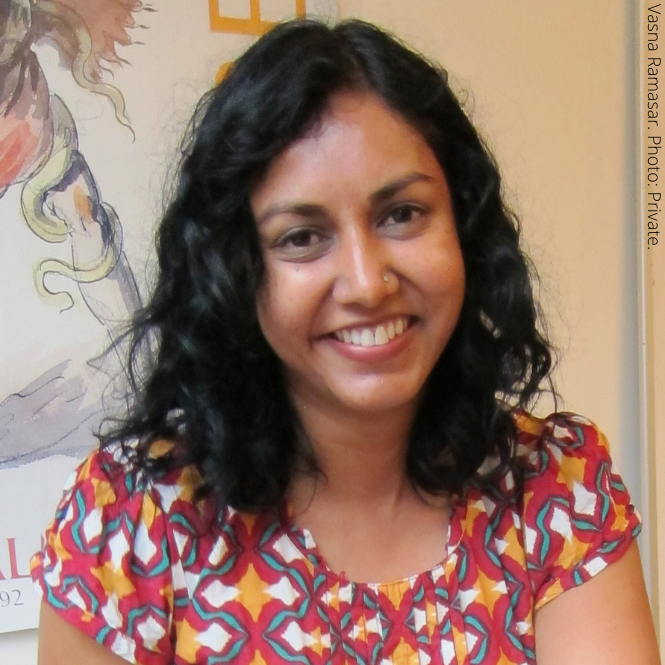
Vasna Ramasar is an Associate Senior Lecturer in the Division of Human Ecology, Department of Human Geography at Lund University, and a Research affiliate at the Lund University Centre for Sustainability Studies (LUCSUS). She is also the Programme Director for the Culture, Power and Sustainability international Master programme.
Q: The Covid-19 pandemic and the ongoing wars have destabilized planetary dynamics, and rumbled current development paradigms. Which are the main viable alternatives you came up with throughout your 10 years of research experience?
A: Firstly, we must recognise what we think of as the development project has been ongoing since the second World War but has not led to substantial improvements in overall welfare or sustainability despite some encouraging gains in for example healthcare. I believe today – more than ever – we need to create a context where ecological functioning and social well-being can be reached together.
Before joining academia, I worked with local communities around the world to increase communities’ life quality. What I learnt is that the measurement parameters of success were not monetary values, but expressed in terms of human development, the relationship with nature, having some degree of control of the decision-making process and how local and indigenous knowledge can be combined with more scientific knowledge.
These dimensions have been directly applied in research projects I have participated in together with the Global Tapestry of Alternatives. In Peru, for instance, working with El parque de la Papa (the Potato Park) we learnt how the genetic diversity of potatoes in Latin America can be maintained in harmony with community cultural and spiritual practices. During the pandemic, the park has successfully maintained their food security and were able to offer food to communities in Cusco, the closest city where the pandemic caused household food shortages. In India, we analysed MAKAAM, a self-help network for women farmers. During the pandemic, their collective action ensured that women were able to secure seeds and job opportunities that were initially only offered to men –thus ensuring gender equality and livelihood security.
Such projects, however, do have limitations in their ability to be scaled up as different local contexts require different approaches. The broad aim of development should therefore be to connect and relate to the global, but still be grounded in the local lived experience – thus building a pluriverse. The key components for viable alternatives should be the social, ecological and cultural dimension, local acceptance and ownership including new development measures based on what people understand to be a good life for themselves.
We also need to be aware that we should neither romanticize the local nor expect all solutions to come from this level. Local processes may embed unhealthy social relations such as patriarchy, casteism and such which do need to be addressed. Further, putting too much responsibility on the local level ignores the structural elements which restrict viable alternatives. Development research requires us to navigate the balance between scales, actors and impact.
Q: What does sustainable development mean in the context of political ecology and for developing countries?
A: To me, the reason to focus on the framework of political ecology is that it offers a way to question power dynamics in human relationships and human-nature relationships. With the critical political ecology lens that I use, the approaches to sustainable development and the tools for its achievement such as the Sustainable Development Goals must be interrogated with regards to who has the power in decision-making, who benefits and who carries the costs. Unfortunately, given the current state of the world, win-win solutions are few and far between and we need to make trade-offs.
Regarding sustainable development from the Global South, this requires an understanding that there are many developmental challenges still to be met. Thus, our attention must be on both the ecological crises but also meeting basic human needs. Some solutions favour the ecological over the social or vice versa but this is not sustainable in the long run. A further aspect is around what I consider procedural justice. That is, how people in the Global South are involved in making critical decisions about the present and the future. Global governance has brought benefits, but also created an unequal playing field where for example small-island states have little capacity to drive the e United Nations Framework Convention on Climate Change (UNFCCC) agenda. Similarly, SDGs and climate finance are sometimes directed to agendas set by elites and technocrats with a poor understanding of what will work in the Global South. We have seen many examples where projects that were intended for environmental protection and social improvement led to people being in a worse-off situation through losing land for subsistence agriculture and paying higher water prices respectively.
To my mind, a direct and explicit engagement with justice is needed when working with sustainable development in research, policymaking and practice. As development researchers, we need to engage with other actors to make sure our research is relevant, appropriate and useful.
Q: Gender studies have been increasingly used to explain the world of sustainability, poverty and democracy. What does it mean to have a feminist and decolonial approach to development?
A: We often think of gender dimensions as women’s rights, counting number of men vs women and women’s participation. However, the decolonial and feminist approach is not just about the numbers. Instead, it looks deeper into empowerment and power, understanding the historical role of the patriarchal system which has led to a particular foundation in terms of development and knowledge production. This relates to gendered inequalities but with an intersectional approach. I believe this approach opens the opportunity to connect to other aspects such as class, race, caste, etc.
Coloniality is not simply about a period of history but the coloniality of power, knowledge and being. A decolonial approach speaks to the need to acknowledge and change the hegemony of narrow knowledge systems that dominate modern universities, and the material power dynamics between those who have benefited from coloniality and those who have borne the burden of it.
Feminist and decolonial approaches are critical to creating spaces for a long-term and sustainable development programme that has positive societal impact. It requires a recognition of our positionality and privilege as development researchers in Sweden and may call upon us to practice development research in different ways.
At Lund University, we are working on this through feminist and anticolonial groups, where we are rethinking our research methodologies. Similarly, I have been involved in creating a Post-Development Academic Activist network (PEDAGOG) which is working toward these aims. When designing research projects, we should engage with the people we are researching with/about. We need to consider what they consider to be relevant and insert this dimension from the design phase in a manner which breaks patterns of hierarchy, power and control. In my own research, I am collaborating with an African NGO to articulate what an African eco-feminist just transition should look like. In the context of development, just transition work is ongoing, but we are seeking to include a local African and gender perspective in the decolonial narrative.
Q: The aim of SweDev is to connect development researchers across Sweden to strengthen collaboration with practitioners. What would you like to share with this community?
A: At a pragmatic level, to get a strong societal impact, we need to consider how to measure the contributions that academics make in the long term with partners and stakeholders. Academic performances should not only be evaluated in terms of the number of publications but should also be community-evaluated.
I have had the privilege of being a development practitioner for ten years before coming back to academia. I think we are all in this field to make a difference and that is a common purpose that can bring us closer together. The challenges we face are great, but we need to be innovative and creative and approach development research from a starting point of care – care for the planet, people and nature.
Written by Alessandro Giacardi, Communication, and Research Intern at Stockholm Environment Institute (SEI) for the Development and Aid Policy Team and SweDev. Edited by Alice Tunfjord and Ylva Rylander at Stockholm Environment Institute (SEI) and Vasna Ramasar.





Recent Comments